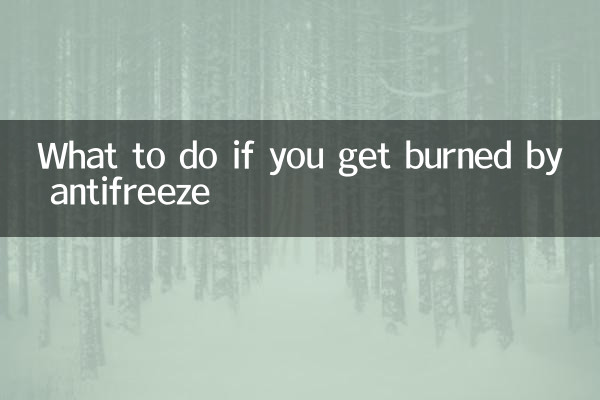What to do if you get burned by antifreeze
Recently, as the temperature drops sharply in winter, the frequency of use of automobile antifreeze has increased, and antifreeze burns due to improper operation have occurred frequently. The main component of antifreeze is ethylene glycol, which has a high boiling point and is corrosive. Once it comes into contact with the skin, it may cause severe burns. This article will combine the hot topics on the Internet in the past 10 days to provide you with emergency treatment and preventive measures for antifreeze burns.
1. Dangers of burns caused by antifreeze

Antifreeze burns will not only cause skin redness, swelling and blisters, but may also lead to systemic poisoning due to the toxicity of ethylene glycol. Here's how antifreeze compares to other common sources of burns:
| source of burns | temperature range | degree of harm |
|---|---|---|
| antifreeze | Above 100°C | High (including chemical corrosion) |
| boiling water | 100°C | middle |
| hot oil | 150-200°C | high |
2. Emergency treatment for antifreeze burns
If you are accidentally burned by antifreeze, please take the following steps immediately:
| step | Operating Instructions | Things to note |
|---|---|---|
| 1. Remove from heat source | Quickly move away from the antifreeze spray area | Avoid secondary harm |
| 2. Wash the wound | Rinse with plenty of running water for 15-20 minutes | Never use ice or ointment |
| 3. Remove clothing | Carefully cut open contaminated clothing | Avoid tearing the skin |
| 4. Seek medical treatment | Go to the burn department of the hospital immediately | Packaging Instructions for Carrying Antifreeze |
3. Recent hot cases
According to statistics from the entire network in the past 10 days, antifreeze-related incidents are mainly concentrated in the following areas:
| area | event type | Proportion |
|---|---|---|
| Northeastern region | Burns while refilling | 42% |
| North China | Broken pipe leaking | 35% |
| East China | Accidental touch by children | twenty three% |
4. Preventive measures
To avoid antifreeze burns, the following precautions are recommended:
1.Fill antifreeze correctly: Wait until the engine has completely cooled down before operating, and wear protective gloves and goggles.
2.Check your vehicle regularly: Focus on checking whether the cooling system pipes are aging. It is recommended to replace the antifreeze every 2 years.
3.safe storage: Store antifreeze out of reach of children and away from direct sunlight.
4.emergency preparedness: Keep water and a first-aid kit in the car, and know the location of the nearest burn hospital.
5. Professional medical advice
Professor Wang, director of the Burn Department of Beijing Jishuitan Hospital, reminded: "Antifreeze burns are chemical burns combined with thermal injuries. Patients must be clearly informed of the contact time and antifreeze ingredients when seeking treatment. Clinically, it is common for patients to aggravate the infection by applying toothpaste, soy sauce and other folk remedies on their own, which must be avoided."
The following are suggestions for treating different burn depths:
| Degree of burn | Symptoms | Processing method |
|---|---|---|
| first degree burn | Red, sore skin | Apply burn ointment after rinsing with cold water |
| second degree burns | Blisters and severe pain appear | Keep the blister intact and seek medical attention immediately |
| third degree burns | Pale or burnt skin, no pain | emergency surgical treatment |
6. Social concerns and policy trends
Recently, many consumer associations issued winter car maintenance warnings, requiring 4S stores and repair points to:
1. Workers must be provided with burn prevention training
2. Post warning signs in the filling area
3. Use antifreeze products that meet national standards (GB 29743-2013)
Data from the China Association of Automobile Manufacturers shows that accidents caused by improper antifreeze operation in the winter of 2023 increased by 17% compared with the same period last year, reminding car owners to pay attention to safety operations.
In case of an emergency, you can call the 24-hour chemical injury first aid hotline: 12320 to 3.

check the details

check the details